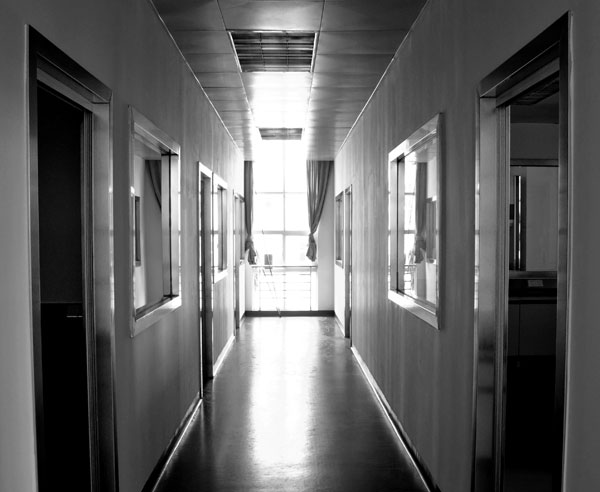
Maria started coming every morning, at the same time. She hovered beside his wheelchair, held his hand, whispered to him. Always the same subject: the tall window at the far end of the ward. She’d been a patient here not long ago, she told him, a patient in this same big room, and in a reverent voice she described the view from the window.
“A waterfall,” she said, her minty breath warm on his ear. “A big waterfall into a blue lake with tall green trees. Can you not hear it?”
And he could hear it, if he listened hard enough. A distant rumble, a low thrumming growl. It was what had kept her going, she said, when she was here. In bed with a broken hip, she listened to the rolling water, and dreamed every day of making her way across the long room to look out at it. And when she was well enough she limped and shuffled to the window and held tight to the sill and stared at the spectacle. It had taken her breath away. A magnificent scene, one that calmed the heart and nurtured the soul. She’d remained there for hours, lost in the perfection of that stunning color snapshot of the Outside World.
“You can do the same,” she said. “Every day, move a little closer. By the time you are there, they tell me your eyes will be healed too. Then you will see what I saw.” She paused, her voice dropping even lower. “It is the work of angels.”
He barked a bitter laugh. “I can’t get there on my own, Ms. Renaldo. I can’t move. Maybe someone could push my chair—”
“No!” she said. It was the first time he’d heard her raise her voice. Then, in her usual whisper, she added, “You must do it alone. Can you not move anything?”
“This arm, just a bit.” He wiggled his fingers.
“Then start there.”
So he did. Every day in his chair he struggled to move the left wheel, and every day Maria came and stood beside him, murmuring encouragement. The muscles in his hand and forearm seemed finally to respond. After a week he’d managed to roll forward a few inches, the next week a foot, the next week two feet. Each time left him exhausted, but now he was using his right arm too, and the task grew easier.
She even gave him a deadline. The end of August—a month from now—the bandages were due to come off his eyes. She expected him to have the chair beside the window on that day. It would be worth it, she promised. Once more she described the view, and the joy and fulfillment he would receive when he first laid eyes on the thundering falls. “It will give you new hope,” she said.
He believed her. He dreamed of what it would look like, and of later capturing its glory on canvas. He knew he could do it. Art was his gift, maybe his only gift. He would paint the scene and hang the result on the wall of the home that he would one day build, and drink of its beauty when he was depressed. The very thought eased his pain.
Meanwhile, he listened. The low rumble seemed louder at times than others, but it was always there, background music behind the everyday hospital chaos. A constant reminder.
So he kept trying. He began to look forward to Maria’s daily visit, even to the struggle and the pain and the sweat. She’d suggested he not tell the doctors about the goal he and she had set up; in fact, she usually came when the staff was elsewhere and pulled his wheelchair the short distance back to the bed afterward. But he didn’t need the doctors to tell him he was improving. He could feel it. Even his legs could move a bit now.
Part of the credit, of course, was due to the hospital. Each afternoon an orderly wheeled him down the hall to a room labeled “physical therapy.” But the progress there was slower. What helped him the most was Maria’s assistance, when they were alone. Her encouragement, her support. Her faith in him.
By August 21, according to Maria, Jimmy was within six feet of the window. On the 22nd, five feet. And then, on August 23, he went nowhere. Maria Renaldo did not appear. It was the first day in weeks that she hadn’t come to visit. When she failed to show the next day as well, Jimmy asked one of the orderlies about her.
“I’m afraid she died,” he said.
Jimmy swallowed. He couldn’t believe it.
“Sudden,” the orderly said. “I’m told she went peacefully.”
Become a Saturday Evening Post member and enjoy unlimited access. Subscribe now



